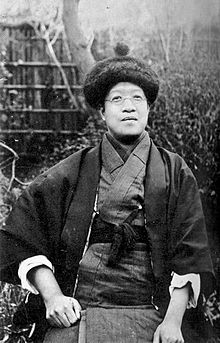
Back تشانغ بينغ لين Arabic تشانج بينج لين ARZ Zhang Binglin Catalan Zhang Binglin German Zhang Taiyan Spanish Zhang Binglin French Zhang Binglin ID 章炳麟 Japanese 장빙린 Korean Zhang Binglin NB
Zhang Binglin | |||||||||||
|---|---|---|---|---|---|---|---|---|---|---|---|
| 章炳麟 | |||||||||||
 Zhang Binglin c. 1900 | |||||||||||
| Born | 12 January 1869 | ||||||||||
| Died | 14 June 1936 (aged 67) | ||||||||||
| Political party | Tongmenghui Unity Party Republican Party Progressive Party | ||||||||||
| Spouse | Tang Guoli | ||||||||||
| Children |
| ||||||||||
| Chinese name | |||||||||||
| Chinese | 章炳麟 | ||||||||||
| |||||||||||
| Chinese name | |||||||||||
| Chinese | 章太炎 | ||||||||||
| |||||||||||
Zhang Binglin (January 12, 1869 – June 14, 1936), also known by his art name Zhang Taiyan, was a Chinese philologist,[1] textual critic, philosopher, and revolutionary.
His philological works include Wen Shi (文始 "The Origin of Writing"), the first systematic work of Chinese etymology. He also made contributions to historical Chinese phonology, proposing that "the niang (娘) and ri (日) initials [in Middle Chinese] come from the ni (泥) initial [in Old Chinese]" (known as niang ri gui ni 娘日歸泥). He developed a system of shorthand based on the seal script, called jiyin zimu (記音字母), later adopted as the basis of zhuyin. Though innovative in many ways, he was skeptical of new archaeological findings, regarding the oracle bones as forgery.
An activist as well as a scholar, he produced many political works. Because of his outspoken character, he was jailed for three years by the Qing Empire and put under house arrest for another three by Yuan Shikai.
- ^ Elisabeth Kaske (2008). The Politics of Language in Chinese Education: 1895 – 1919. BRILL. pp. 409–. ISBN 978-90-04-16367-6.